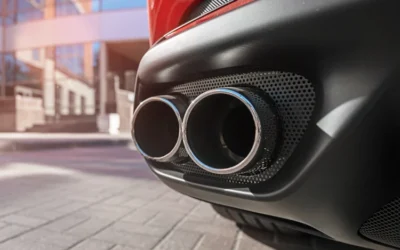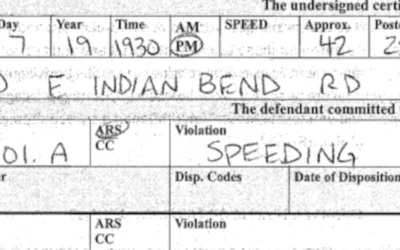Leaving The Scene Of An Accident In Arizona
Leaving the scene of an accident, or hit and run, are general terms used to encompass a variety of laws related to what happens after an accident. In Arizona, there are 4 different statutes with a bunch of subsections that cover what a driver is required to do following an accident.
Below, we will step through the requirements and various violations a driver could be charged with for failing to meet those requirements. The video provides a general overview and the text after the video offers more detail.
CALL NOW OR UPLOAD YOUR TICKET
A.R.S. 28-662 – Stop And Remain At The Scene
If you are involved in an accident, you are required to remain at the scene of the accident, and you are also required to remain at the scene without obstructing other traffic. A.R.S. 28-662 covers this in three parts:
-
- A.R.S. 28-662(A)(1) Requires you to immediately stop your car at the scene of the accident or as close to the accident scene as possible. In other words, if you collide with another car (or even a pole or a wall), don’t keep driving. Stop.
- A.R.S. 28-662(A)(2) Requires you to remain at the scene until you have fulfilled the requirements of 28-663(A)(3). In a nutshell, this means stick around at the scene of the accident until you have exchanged insurance, registration and contact information, and until anyone injured has been assisted.
- A.R.S. 28-662(A)(3) Requires you to stop in such a way as to minimize any obstruction to other traffic. In other words, pull over to the side of the road if possible.
A.R.S. 28-663 – Exchange Information And Render Assistance
If you are involved in an accident, and after you’ve stopped at the scene, you need to exchange information with the other driver(s) and render reasonable assistance to anyone who is injured. A.R.S. 28-663 covers this in three parts:
-
- A.R.S. 28-663(A)(1) Requires that you provide your name, address and registration number of the vehicle you were driving.
- A.R.S. 28-663(A)(2) Requires that, upon request, you show your driver license to the person you hit, or to the driver or occupants of the vehicle you hit, or to the person attending the vehicle you hit. In other words, if someone involved in the accident asks to see your license, show it to them.
- A.R.S. 28-663(A)(3) Requires that you render “reasonable assistance” to anyone injured at the accident. While you may not be a medical professional, you can at least make arrangements for the injured person to be transported to the hospital.
A.R.S. 28-664 – Leave Contact Information After Accident With Unattended Car
If you hit a car that is unattended (the owner or driver is not with the car), you still need to stop and leave your contact information. A.R.S. 28-664 covers this in two parts:
-
- A.R.S. 28-664(A)(1) Requires that you immediately stop after striking another vehicle.
- A.R.S. 28-664(A)(2) Requires that you either locate the operator or owner of the vehicle you struck and leave your name and address, or that you leave a written note with your name and address on conspicuous place on the vehicle you struck.
A.R.S. 28-665 – Leave Contact Information After Striking A Fixture
If you crash into a fixture or other object legally on or adjacent to the highway, you need to stop and provide your contact information. A.R.S. 28-665 covers this in two parts:
-
- A.R.S. 28-665(A)(1) Requires you to take reasonable steps to locate and notify the owner of the fixture or property and tell them about the accident, provide your name and address, and provide you registration.
- A.R.S. 28-665(A)(2) Requires you to show your driver license upon request to the owner of the struck fixture or property.
What are the penalties for a conviction for leaving the scene of an accident?
All of the charges above are class 1 misdemeanors, except for A.R.S. 28-663A3 regarding rendering assistance, which can be charged as a class 6 felony. A class 1 misdemeanor carries the potential for the following penalties:
Possible Penalties:
- Fines up to $2,500 plus surcharges and court assessments that could nearly double the total fine
- Up to 6 months in jail
- Up to 3 years probation
- Restitution for any damages to the victim or victim’s vehicle
Likely Penalties:
- Class 1 misdemeanor conviction
- Fines much lower than the maximum
- 6 points on Arizona driving record (and Arizona reports the conviction to other states)
- Restitution
- Jail and probation are rare
Possible Collateral Consequences:
- 6 points on your driving record in Arizona
- Increased insurance rates
- Immigration issues
- License suspension or Traffic Survival School depending on the driver’s history and accumulation of points
- Having to disclose a criminal conviction on job applications
Your Problem Solvers

David Enevoldsen, Partner
My favorite thing about being a criminal defense attorney is getting my client’s charges dismissed at trial. Driving on the beautiful Arizona highways is a close second.

Chris Rike, Partner
I love being a criminal traffic defense attorney because it marries two of my favorite things: cars and fighting for the rights of drivers.
Fighting A Ticket For Leaving The Scene Of An Accident
The outcome of a leaving the scene of an accident ticket will depend a lot on the facts of the case. Some possible defenses might be:
I didn’t know I hit a vehicle.
We often see drivers who barely graze another vehicle. The contact is so light that the driver is unaware any contact was made. Being unaware of any accident, the driver keeps driving. Later, the police track them down and alert them to the fact that they struck another vehicle.
I stopped, but the other driver took off.
We also see situations where a defendant stops after an accident, but the other driver takes off. Then later, the driver who took off calls the police and flips the story, saying they stopped and the defendant took off!
Negotiating A Dismissal Or Improved Outcome
Make The Victim Whole
A very important part of resolving a case involving an unattended car is to make sure the owner of the other car is made whole. In other words, make sure that any damage to the other car is repaired at no cost to the owner.
Provide An Alternative Explanation
This could involve offering a compelling reason why you failed to remain at the scene or providing evidence that you attempted to contact or locate the other driver or owner of the damaged property.
Provide information about your good character and background.
This could include providing evidence of a clean driving record, or your community service and charitable work, or any other details that show you are a good person who tries to do good things.
With the right factual circumstances, a good background, and the help of an experienced attorney, you have a good opportunity to secure a reduced plea or even a dismissal of the charge.
Schedule a free consultation today.
Email us below and we’ll reach out.
Latest Blog Posts
Can you get a ticket in Arizona for driving a loud car?
Can you get a ticket in Arizona for driving a loud car?Unfortunately, YES. In today’s nanny state, it is certainly possible to get a ticket for the sounds your car makes. We actually see this a lot. The severity of the tickets can range from an annoying no-points...
What if a traffic ticket has the wrong information?
What If A Traffic Ticket Has The Wrong Information In Arizona?It is not unusual that a traffic ticket has the wrong information. We see all kinds of traffic tickets in our office from many different law enforcement agencies. Some tickets are entirely hand-written on...



